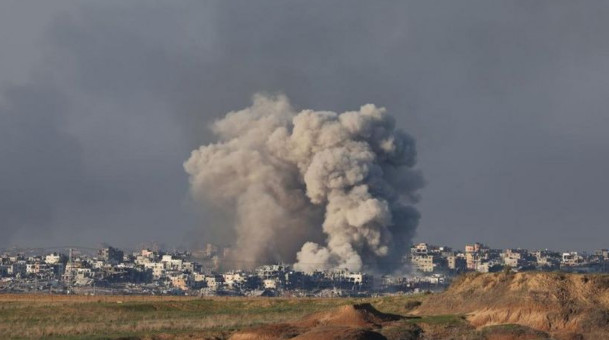Three Israeli hostages mistakenly killed by Israeli soldiers in Gaza were shot dead while holding a white cloth, an Israeli military official says.
The official said the case was “against our rules of engagement” and an investigation was happening at the “highest level”.
The hostages – Yotam Haim, 28, Samer Talalka, 22, and Alon Shamriz, 26 – were killed in Shejaiya on Friday.
Israeli troops have been facing stiff resistance in the area near Gaza City.
The case has added pressure on Israeli authorities to reach a deal for the release of the more than 120 captives who remain in Gaza.
The wait of their families has gripped Israel, as the military carries out its offensive against Hamas.
Speaking at a news conference, Prime Minister Benjamin Netanyahu said there would be no let-up in the Israeli operations.
“Military pressure is necessary both for the return of the hostages and for victory. Without military pressure… we have nothing,” he said.
Hamas, for its part, said it had told mediators there would be no negotiations to release hostages “unless the aggression against our people stops once and for all”.
An Israeli military official, who spoke on condition of anonymity, said an initial investigation by the Israel Defense Forces (IDF) suggested the three hostages emerged shirtless from a building, with one carrying a stick with a white cloth.
One of the soldiers, the official added, felt threatened, as the men were at a distance of tens of metres, declared them “terrorists” and opened fire. Two were immediately killed while the third, wounded, returned to the building.
A cry for help was heard in Hebrew and the battalion commander ordered the troops to cease fire. The wounded hostage later re-emerged, and was shot and killed, the official said.
The hostages had either been abandoned by their captors or escaped, the official added.
A building with a message SOS was found in the area, and the authorities were investigating whether it was linked to the killed hostages.
Meanwhile Wichian Temthong, a freed Thai hostage who was held with the three men, recalled his time with them, saying that, as they had no common language they used hand signals to communicate and give each other moral support. He was “very shocked” and “saddened” to learn of the deaths of the men he spent nearly 50 days in captivity with, he said.
Since the end of a temporary ceasefire between Israel and Hamas earlier this month, the families have urged the Israeli government to reach a new truce for at least some of the captives to be freed. The initial deal led to the release of more than 100 hostages, in exchange for Palestinians held in Israeli jails.
In Tel Aviv, thousands of people gathered outside the city’s Museum of Art, in what is now known as Hostages Square, and called for a truce, chanting “Bring them home now”.
“It’s our biggest fear what happened – hostages who were alive are now dead,” Naama Weinberg, whose cousin Itai Svirsky is a hostage, said at the vigil. “We don’t need bodies, or bags. Make a ceasefire until all hostages are back, alive. Every day that passes by we’re just discovering more and more names of hostages that were taken alive and are now coming back dead.”
The war in Gaza, launched in response to the Hamas attacks that killed around 1,200 in Israel, has killed more than 18,000 people, according to the local health authorities, and pushed hundreds of thousands of others from their homes.
Vast areas of the territory have been destroyed, and the United Nations has warned of a humanitarian catastrophe amid widespread shortages of basic supplies.
Israeli authorities say the offensive’s goal is to destroy Hamas and release the hostages.
Amid mounting Palestinian civilian casualties, Israeli authorities have come under growing international pressure, including from the country’s main ally, the US, but they have resisted calls for a ceasefire.
Mr Netanyahu deflected the pressure again on Saturday.
“Despite grief, despite international pressure, we continue until the end, nothing will stop us,” he said.
The BBC’s Thanyarat Doksone in Bangkok contributed to this article

